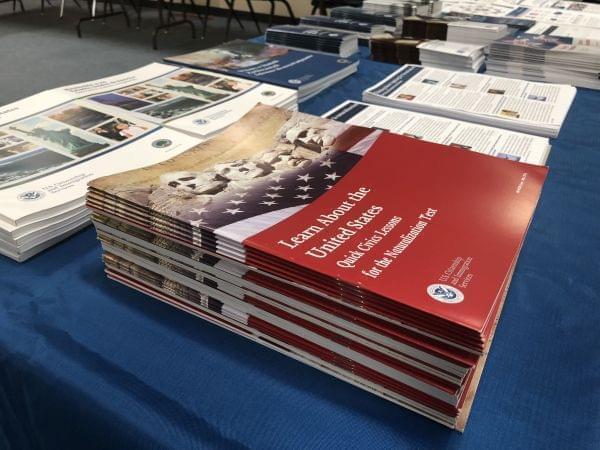C-U Immigrant Organizations Concerned About Proposed Changes To “Public Charge” Rule

Educational materials for the Immigrant Community Conference and Benefits Fair Daniel Baker/Illinois Public Media
A group that provides support for new immigrants in Champaign-Urbana is voicing its concern over a Trump administration proposal to expand the list of public benefit programs that can count against immigrants when they go to apply for residency in the U.S.
The Department of Homeland Security released a proposal in October that would add Supplemental Nutrition Assistance Program (SNAP) benefits, housing vouchers and Medicaid to the “public charge” rule, potentially preventing immigrants with low or moderate incomes from extending a visa or applying for a green card, immigrant advocates say.
“Organizations will actually be further strained to meet the needs of people locally who are cancelling their SNAP benefits or Medicaid out of fear of not being able to renew visas or get a green card in the future,” said Gloria Yen, director of the New American Welcome Center at the University YMCA in Champaign.
Currently, an immigrant who applies for a green card can be classified as a “public charge,” a term used by immigration officials to identify someone who is primarily dependent on the government, if they use Temporary Assistance for Needy Families (TANF) or Supplemental Security Income (SSI). Utilizing the program does not guarantee that a green card will be denied.
The Trump administration says expanding the public charge rule to go beyond cash assistance programs, like TANF, would promote self-sufficiency and lower spending. “Under long-standing federal law, those seeking to immigrate to the United States must show they can support themselves financially,” Department of Homeland Security Secretary Kirstjen Nielsen said in a statement.
Yen said the proposed change, which is open for a 60-day public comment period until Dec. 10, has already created a chilling effect for some clients at the New American Welcome Center who are more reluctant to access benefits.
“We have seen several people over the past few months who have come to us with fears about applying for fee waivers as they’re applying for citizenship, or getting food stamps for their children,” Yen said. “When, in fact, they are still eligible for those benefits.”
The center plans to host a “public charge” comment workshop Nov. 27 from 5-7 p.m., to educate the public about the proposed rule and how to submit a comment to the Federal Register.
Nationwide, there was a decline in the number of eligible immigrant families who applied for SNAP benefits in the first part of 2018, according to a preliminary report presented earlier this week at the American Public Health Association annual conference. Deputy Director of Policy Strategy for Boston Medical Center’s Children’s HealthWatch Allison Bovell-Ammon, and lead author of the study, said the threat of policy changes around immigration could be partly to blame for the 10 percent decline in SNAP enrollment.
“These findings demonstrate that rhetoric and the threat of policy changes, even before changes are enacted, may be causing families to forego nutrition assistance,” Bovell-Ammon said.
Links
- New Report Shows Immigrants Contribute $1.4 Billion To Champaign County Economy
- Another Cause of Doctor Burnout? Being Forced To Give Immigrants Unequal Care
- State Lawmakers Consider ‘Voices Act’ to Help Immigrant Crime Victims
- Fearing Deportation, Unauthorized Immigrants Shy Away From Signing Kids Up For Federal Food Aid
- Bloomington-Normal’s ‘Welcoming City’ Debate; Healthcare Access For Immigrants; Illinois Gun Owners

